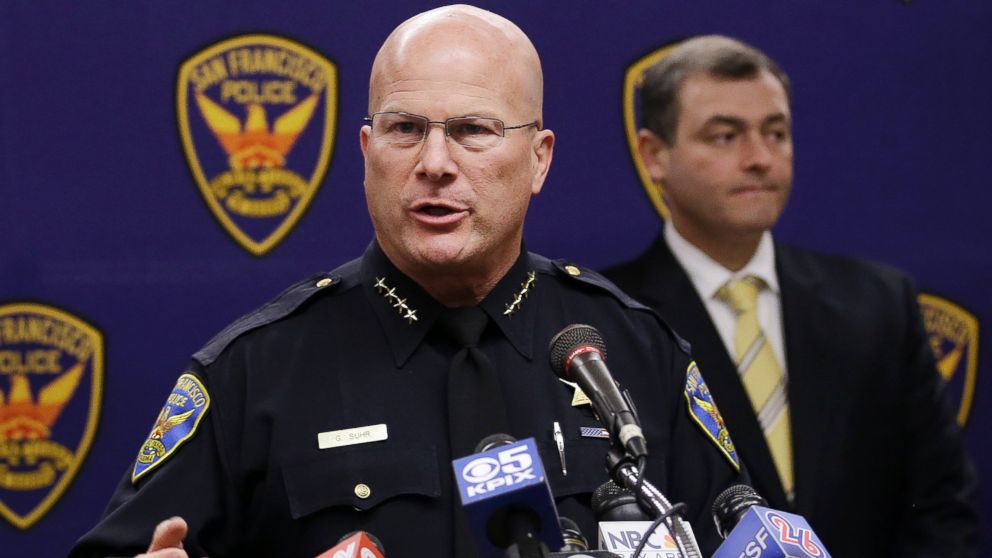San Francisco's New Top Cop Faces Tough Road Ahead to Mend Racial Tensions
Acting Police Chief Toney Chaplin may have the toughest job in the city.

— -- San Francisco Deputy Police Chief Toney Chaplin may have the toughest job in the city right now.
The 26-year department veteran has been appointed acting police chief by Mayor Ed Lee, following Greg Suhr’s resignation Thursday amid a string of police shootings and racially charged scandals.
Lee expressed his admiration for Suhr’s commitment to reform, but said the progress hasn’t been fast enough. The mayor said he hopes appointing Chaplin, who is black, will help heal strained relations between the San Francisco Police Department and the African-American community.
"The past several months have shaken and divided our city, and tensions between law enforcement and communities of color that have simmered for too many years have come into full view,” Lee said at a news conference Thursday. “I will hold the acting chief and the department to a high standard of urgency to implement the reforms we've already announced in the past several months.”
Suhr’s resignation came just hours after a fatal police shooting on Elmira, an alley off Industrial Street close to the Interstate 280 interchange. Police had been on the hunt for stolen cars when they found one parked with a 27-year-old black woman sitting behind the wheel. Suhr said the vehicle had been reported stolen and the woman inside failed to comply with the investigation. She instead drove off and crashed into a parked truck, police said. Struggling to arrest her, an officer fired one shot, striking the woman, who was rushed to San Francisco General Hospital, where she later died.
Suhr responded by announcing a slew of reforms aimed at reducing police shootings and calling in the U.S. Department of Justice to review his department's policies and procedures. But ultimately the incident was the breaking point for the police chief, whose tenure had already been rocked by a racial and homophobic text messaging scandal involving officers as well as three fatal police shootings within the past six months.
But simply swapping out the department leadership won’t do the trick, experts said. Chaplin must immediately pick up where Suhr left off by continuing to reach out to black community leaders to rebuild trust and diversify recruitment. He should also make the department’s data on policing available to the public to allow for external evaluations, while demanding more rigorous internal analyses to identify issues as well as prevent them, experts said.
“Everything stems from understanding the data that you have and then opening it to the public,” said San Francisco resident Eric Liu, a New America CA fellow and founder of Bayes Impact, which uses data to address public interest problems. “If San Francisco can do that, then it will actually be a really powerful model for the nation as well.”
A bill that passed in California last year requires each sheriff and police chief to submit a report on justifiable homicides to the U.S. Department of Justice each year. But the first deadline isn’t until next year and the bill doesn’t require reporting information on other civilian complaints, like the use of racial slurs. Chaplin should anonymize and publish all information currently available to the San Francisco Police Department on its website to improve transparency and drive reform, Liu said.
“This is what we need to find the evidence and competence behind their statements of reform,” he said.
Retired San Francisco Police Chief Anthony Ribera said Chaplin must also discipline and organize the department across all aspects of police work, not just the use of force, so that no disciplinary cases go unheard. It’s also critical that he continue Suhr’s commitment to regularly meeting with leaders in the black community to bridge any gaps with the department. Ribera, however, warned that Chaplin is just the interim police chief until the mayor designates a permanent replacement.
“There’s a whole lot of talent in the San Francisco Police Department,” said Ribera, who is also the director of the University of San Francisco’s International Institute of Criminal Justice Leadership. “If the mayor is listening to me -- take a good hard look within the department before you start thinking about going with someone outside.”
The Rev. Amos Brown, president of the San Francisco chapter of the NAACP, said he felt Suhr became the “scapegoat” for the department’s difficulties. Brown, who supported Suhr throughout the controversies, said Chaplin is already well respected and well-known within San Francisco’s black community, and he’s confident in his ability to rise to the challenge. But the department’s problems go beyond its leadership. They stem, in part, from a lack of diversity and unity among the officers, he said.
“For people to say that it’ll be better if you get rid of one man ... there will be more challenges,” Brown said. “We just need to be united.”